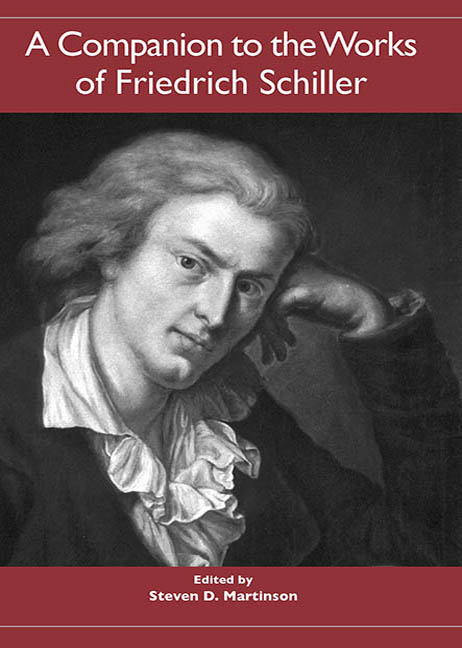Book contents
- Frontmatter
- Dedication
- Contents
- Acknowledgments
- The Works of Friedrich Schiller
- Editions and Abbreviations
- Introduction: Schiller and the New Century
- Intellectual-Historical Settings
- Major Writings
- Die Räuber: Structure, Models, and an Emblem
- Kabale und Liebe Reconsidered
- Great Emotions — Great Criminals?: Schiller's Don Carlos
- Concerning Aesthetic Education
- “On the Shores of Philosophy”: Schiller's Lyric Poetry, 1795
- Wallenstein
- Maria Stuart: Physiology and Politics
- Die Jungfrau von Orleans
- Wilhelm Tell
- Schiller's Legacy
- Works Cited
- Notes on the Contributors
- Index
Great Emotions — Great Criminals?: Schiller's Don Carlos
from Major Writings
Published online by Cambridge University Press: 28 April 2017
- Frontmatter
- Dedication
- Contents
- Acknowledgments
- The Works of Friedrich Schiller
- Editions and Abbreviations
- Introduction: Schiller and the New Century
- Intellectual-Historical Settings
- Major Writings
- Die Räuber: Structure, Models, and an Emblem
- Kabale und Liebe Reconsidered
- Great Emotions — Great Criminals?: Schiller's Don Carlos
- Concerning Aesthetic Education
- “On the Shores of Philosophy”: Schiller's Lyric Poetry, 1795
- Wallenstein
- Maria Stuart: Physiology and Politics
- Die Jungfrau von Orleans
- Wilhelm Tell
- Schiller's Legacy
- Works Cited
- Notes on the Contributors
- Index
Summary
In his letter of June 7, 1784 to the Mannheim stage director Baron Wolfgang Heribert von Dalberg, and upon having already written Die Räuber, Fiesco, and Kabale und Liebe, Schiller promised a new work, not a political work (“ein politisches Stük”) but, instead, a family portrait, “ein Familiengemählde in einem fürstlichen Hauße.” That sounds harmless, and it was supposed to be. Not only does Schiller explicitly deny the politically explosive material of his Carlos drama for tactical reasons; even the innocent designation “Familiengemälde” does not indicate what will happen later on within the royal family.
The sixty-year-old Philip of Spain, a political haggler (“politische[r] Schacher”; Müller, 225), and the most powerful man in the old and new world, marries the young French princess Elisabeth of Valois. Because she loves Philip's son and is even promised to him, it costs Philip his son's love. That means he must fear Carlos in two ways: first, as a rival in winning Elisabeth's love and, second, as his successor, who, he believes, could overthrow him at anytime, as he himself had done to his own father. The morally austere Philip, who spies jealously (“mit hundert Augen”) on his faithful wife's relationship with Carlos, has an affair with the countess Eboli. Eboli desires Carlos and confesses her love for him, but is rejected and therefore does everything she can to take revenge on Carlos and Elisabeth. All of this lies hidden under the term “Familiengemälde.” Private conflicts, the fabric from which the domestic tragedies have been woven since Lessing's Miss Sara Sampson and Emilia Galotti, suddenly achieve tremendous significance since they do not take place in a tiny principality but at the Spanish court.
Schiller's ingenious exposition, which stages the private family history and affairs of the state (the preservation of Spanish authority over Flanders, the prosecution of high treason, the Inquisition, etc.) does not create a drama of prohibited love followed by a political drama. Instead, he is much more successful in tying the two themes together, for he writes the genre of domestic tragedy into the fabric of the tragédie classique. The bürgerliches Trauerspiel shows sovereigns in the act of persecuting innocent daughters of middle-class households and selling young men to serve as soldiers in foreign countries.
- Type
- Chapter
- Information
- A Companion to the Works of Friedrich Schiller , pp. 137 - 146Publisher: Boydell & BrewerPrint publication year: 2005



